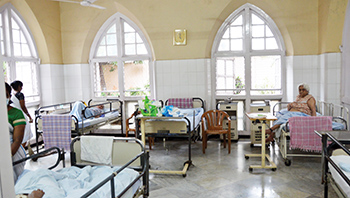Bawas don’t seem to die
Berjis Desai
"Bawa,
aay ummaré
bhi
golat
marvanu
nai chuké (even at this age,
father would gladly have a roll in the haystack),” says a 48-year-old son for his 72-year-old father’s libido, with unabashed admiration. There is much merriment in an old age home in Navsari at the wedding of a toothless octogenarian to his well-preserved co-resident in her late 60s; with the
newly weds making a valiant effort not to let their alliance remain purely platonic. A 90-year-old matriarch who has lost her only son never misses her two Parsi pegs of whiskey before dinner. A group of 70 somethings
plan an excursion to
oxygen starved Leh. Grandfathers share a bawdy joke with their grandsons without the slightest inhibition. A 68-year-old lady with oodles of bad cholesterol polishes off a dozen oysters at a fancy Parsi wedding party at a five star (Hilla
masi é étla oyster
afaari
kaarya ké, hotel
ma
thi
siddha hospital ma
gaya). Bristling joie de vivre, irascible sense of humor, an unending zest for life and a ‘who bothers about wrinkles’ existence.
Languishing in the chronic ward of the J. J. Hospital with painful bed sores, as water mattresses are too expensive. Elderly suffering from a disproportionately large number of Parkinson’s and Alzheimer’s. Old spinsters glumly staring
outside the window at dusk in an increasingly alien environment. Childless couples barely managing their infirmities and humiliations. Depleting savings and unwise investments compelling the old to survive with only one meal and often without critical medicine, being too
self respecting to seek charity help. Gnawing loneliness, arthritic aches and pains, enduring adult diapers and other geriatric indignities in silence; the rising sun brings no joy but frustration at having failed once again to pass away in sleep. The body and mind seek deliverance from physical and emotional pain.

Parsi Ward at JJ Hospital
Which of the above two scenarios best describes the state of our elderly, one of the few ethnic groups in the world to have 30% of its members above the age of 60. Amongst fellow communities in India, the highest longevity rate. Bawajis don’t seem to die, goes the wonderment. Is longevity a curse on the community? Relative economic prosperity coupled with Western mores results in children living independently from their parents even if the house is large enough to accommodate all. Joint families simply don’t exist. Large numbers migrate leaving their parents behind. Severe winters don’t go well with congenital diseases, better to endure loneliness in a warmer clime. Decades of marrying first cousins have resulted in
disproportionately high incidence of neuroticism, rheumatic
disorders and prostate cancers. Loneliness is a slow poison. Dementia makes fools of those who once strode proudly on the national stage. There is no fool like an old fool.
Old age homes have not been popular. Most Parsis value privacy more than camaraderie and prefer to stay alone in large dark houses with unswept bedrooms; grandfather clocks chiming every quarter hour, often out of
synchrocity due to bad maintenance. You can smell sadness in these houses. Frequently cheated by dishonest relatives and caretakers, they become paranoid and suspicious of all. Fear of a fall and a fracture deters them from venturing outside. Old ladies
praying in the evening from the Khordeh Avesta, repeating the same para a dozen times due to forgetfulness; old gentlemen downing half a glass of cough syrup as they can no longer afford their evening drink; waking up with anxiety attacks in the middle of the night with none to soothe them back to sleep; staring blankly at their visiting children whom they no longer recognize. Blessed are those few old who enjoy the warmth and company of their loved ones. Little great-granddaughters fascinated by the wrinkled fingers of their great-grandpa and nonagenarians striding proudly with a walking stick in the park are fast diminishing images.
We do seem to focus on our youth but we appear to be indifferent to our elders. Diseased minds and bodies do make them irritable, unreasonable and crotchety. But
nevertheless they have to be cared for and loved. Only supporting them monetarily is not enough. How many times do we make them laugh or celebrate their birthdays,
however unwelcome to them, and how many times do we discuss newspaper headlines with them or feast together on nostalgia by taking them through pleasant memories of the yesteryears or pamper them by putting a chocolate or a date in their toothless mouths? A very popular Gujarati song titled Bhoolo bhalé
biju
badhu, ma
baap né
bhoolso
nahin, contains a memorable couplet:
lakho
kamaata ho bhalé, ma
baap jéthi
na
tharya, é lakh
nahin pun
raakh chhé, é
manvoo
bhoolso
nahin (you may be earning lakhs but if you cannot keep your parents happy, those lakhs are worthless ash). A dying community with great financial resources must invest in its youth and ensconce its old.
Berjis M. Desai,
senior partner of J. Sagar Associates, advocates and solicitors, is a writer and community activist.
